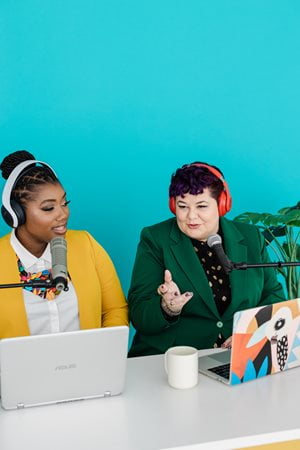Long-Standing Research Project Evolves into Podcast
"In Schools, Outta Pocket" aims to share schooling experiences of Black, Brown families and discuss the ways they experience exclusion and racism
A pair of former K-12 teachers turned researchers have launched a unique podcast based on their long-standing narrative research project. "In Schools, Outta Pocket,” created by Dr. Wideline Seraphin, an assistant professor in the UTA College of Education, and Dr. Ana Carolina Díaz Beltrán, an assistant professor at the University of Texas Rio Grande Valley, recently released their first episode.
The podcast features the voices of K-12 students and is geared toward educators, researchers, and individuals interested in equity.

Seraphin says it’s a project with deep roots.
“The podcast is an offshoot of a larger, community narrative project that we’ve been working on since 2014,” said Seraphin. “There were a lot of protests on college campuses at the time. What really shocked me and Ana was that Black student leaders received a lot of anonymous hate comments on social media that threatened violence. We realized our communities didn’t know how to talk about racial violence.”
The pair started recording dialogues with friends. By 2018, they had produced a documentary, Schooling Narratives.
“The primary goal of the documentary was to bring K-12 student voices to life by featuring stories that don’t often get a lot of attention or focus,” added Seraphin.
In 2023, Seraphin and Beltrán produced the initial episode centered on Diamonde*, then a student-leader of her high school’s Black student organization.
The episode begins with a missed day of school that later became fraught with difficulties as Diamonde learns about the controversial class lesson that occurred during her absence. The topic was basic: how to find quality websites to use in research assignments. However, for the demonstration, the teacher referenced a white supremacy website.
“Out of all the millions and thousands of websites out there, why did you choose that one?” Diamonde recalls thinking. “This is health class, and you’re talking about white supremacy and Martin Luther King.”
As a student leader, the school’s school administration – turned to her.
“There were multiple other [students of color] that went home to their families and complained about what happened. I guess it got back to administration, and they felt like they needed to fix the problem,” said Diamonde. “I just remember sitting there thinking, why are they staring at me? Why do they keep looking at me? I just felt like they were expecting an answer or a response from me when I didn’t even know what was going on. I just felt singled out. I felt alone in that classroom because I was the only Black (student). There was no other minority (student) in there; it was just me. After that, I called my mom crying saying, ‘I don’t know what’s going on, but I know that this is wrong.’”
“Not every child is experiencing schooling in the same way,” Beltrán said. “There are many experiences that are invisible, while others are hypervisible. In Diamonde’s episode, we talk about that. One of the main purposes from the beginning is to listen to the person’s experience, to listen to their stories. As educators, we must learn to de-center ourselves and slowly process what we are listening to.”
She added that the decision to focus the podcast on K-12 children and their families was intentional.
“That curation is based on our own knowledge and research and the growth of the scholarship that we’ve been doing for years. It’s not just our opinion,” she said.
“I think about the episode in terms that teachers are learning to listen and unlisten,” added Seraphin. “When I think about the professional development experiences that are available to teachers that trying to do this work, it is often ‘one and done’ experiences. It’s not an ongoing discussion with their families and communities.”
Both she and Beltrán hope the podcast helps fill the gap.
“You can listen to educators who have experience. You have new community of folks who are talking intently. We hope this to be a sustained, accessible space. It’s not bogged down by jargon. These stories are everyday stories,” said Seraphin.
“If we say we care about all students as educators, then we need to do the work. Empirically, we know that does not happen. It’s easily proved through achievement gap data, funding budgets, and state policies. As an educator, strengthening your ability to understand systems of oppression benefits all children.”
“As we worked with the families and the students, it’s not like they don’t have fear or have to make a difficult decision to share their stories. But they make it,” Beltrán added. “However, you have the adults in schools who don’t do the work. This first episode is our first attempt to generate spaces that are inviting to do the work.”
*Name changed in the podcast to protect the student’s identity.
Photo Credit: Melissa Spurrier